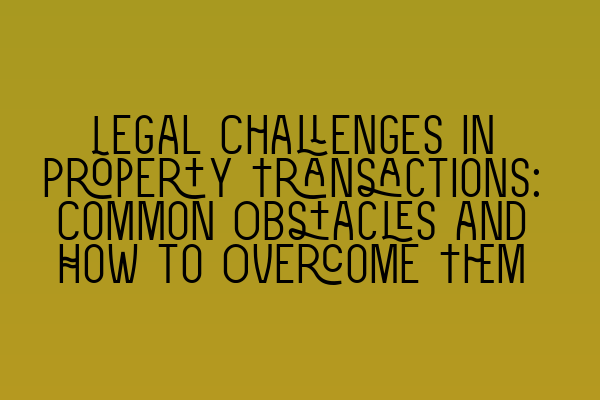Legal Challenges in Property Transactions: Common Obstacles and How to Overcome Them
Welcome to the blog of SQE Property Law & Land Law. As solicitors specializing in property transactions, we understand the complexities and challenges that can arise during these processes. In this article, we will discuss some common legal obstacles faced by individuals and businesses in property transactions, and provide practical tips on how to overcome them.
1. Title Issues
One of the most common challenges in property transactions is title issues. These can include disputes over ownership, boundary disputes, or issues with the legal documentation of the property. It is crucial to conduct a thorough title search and engage the services of a reputable conveyancer or property solicitor to ensure the title is clear and free from any encumbrances.
For a more detailed guide on title issues, please refer to our comprehensive guide.
2. Financing and Mortgages
Securing financing and mortgages for property transactions can also be a significant hurdle. Lenders have strict criteria for mortgage approvals, and any issues in the buyer’s financial history or the property’s valuation can delay or even terminate the transaction. It is advisable to engage the services of a mortgage broker or financial advisor to navigate this process smoothly.
3. Planning and Development Regulations
In property transactions involving development or renovation projects, navigating planning and development regulations can be daunting. Compliance with local zoning laws, building regulations, and obtaining necessary permits are vital steps in ensuring the legality of the project. Engaging a solicitor experienced in property development law can help streamline this process and ensure compliance.
For more information on updates in UK property laws and their implications, read our article on key changes and implications.
4. Disputes and Litigation
Unfortunately, property transactions can sometimes result in disputes or legal action. Common issues include contractual disputes, failure to disclose property defects, or disagreements between buyers and sellers. Resolving these disputes may require negotiation, mediation, or, in severe cases, litigation. Engaging a solicitor experienced in property litigation can be crucial in protecting your interests and achieving a favorable resolution.
5. Lease Agreements
For those involved in lease agreements, understanding and navigating lease laws is essential. Both tenants and landlords need to be aware of their rights and responsibilities, the procedures for rent increases or evictions, and the terms of the lease. Consulting with a solicitor experienced in lease law can help ensure a fair and legally binding lease agreement.
To learn more about navigating lease laws in the UK, check out our article on essential guidelines for tenants and landlords.
Conclusion
Property transactions can be complex and challenging, but with proper guidance and knowledge, these obstacles can be overcome. Engaging the services of an experienced property solicitor or conveyancer is crucial to navigating the legal complexities involved in these transactions. By addressing title issues, financing challenges, planning and development regulations, disputes, and lease agreements, you can ensure a smooth and successful property transaction.
For more property law resources and tips, refer to our articles on avoiding common pitfalls and ace your exam preparation.
